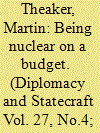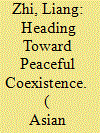| Srl | Item |
| 1 |
ID:
150076


|
|
|
|
|
| Summary/Abstract |
This analysis critiques the impact of President Dwight Eisenhower’s 1953 “Atoms for Peace” initiative on Washington’s alliance with Britain, itself a newly crowned nuclear state. Prime Minister Winston Churchill’s taste for personal diplomacy led him to support his friend’s proposal without real consideration for how the contributions of fissionable materials and manpower demanded by the scheme would damage Britain’s overstretched domestic nuclear project. Membership of an international atomic agency allowed Britain to reaffirm its global status whilst depleting the resources needed to develop its native technology. In turn, the article discusses the commercial challenge posed by American nuclear firms and highlights how reactor exports quickly became a contest between the quality of British research and the quantity of American subsidies. In this way, it establishes how “Atoms for Peace” prejudiced both Britain’s domestic nuclear effort and export potential, in turn shedding light on Washington’s relations with an ailing Great Power.
|
|
|
|
|
|
|
|
|
|
|
|
|
|
|
|
| 2 |
ID:
161498


|
|
|
|
|
| Summary/Abstract |
Since coming to power in Myanmar, the National League for Democracy (NLD) has unambiguously indicated that it will carry out Burma's foreign policy as it was established during the country's foundation (i.e., an “independent, active and nonaligned foreign policy”). Retrospectively, we can trace the historical precedents of the NLD's foreign policy to Burma's foreign policy in the period of the Korean War in 1953. Using Burmese, Chinese, Indian, and US official documentation, and following an international history approach, I explore the background, process, and effects of Sino-Burmese relations in the period of 1953 to 1955 as an entirety. Thus, in this article I offer important historical insights to contemporary Burmese foreign relations.
|
|
|
|
|
|
|
|
|
|
|
|
|
|
|
|